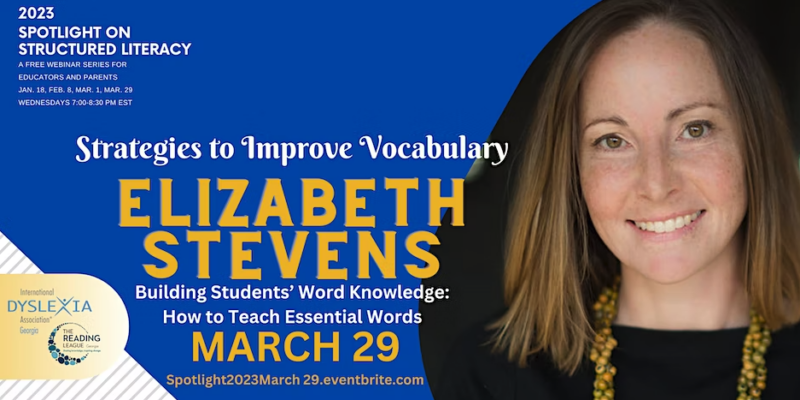
The International Dyslexia Association Georgia and The Reading League Georgia have partnered to bring you the 2023 Spotlight on Structured Literacy Webinar Series. The live webinars are FREE and OPEN to all. Certificates of Attendance will be available for those registrants who complete a post-webinar knowledge check/survey form after each event. The form must be completed by the deadline.
Register here: https://www.eventbrite.com/e/building-students-word-knowledge-how-to-teach-essential-words-4-sl-tickets-525991894917
Attendees of the March 29th webinar will learn the importance of providing vocabulary instruction across content areas (i.e., English language arts/reading, social studies, science, mathematics) and the role of word knowledge for students’ reading comprehension. First, the presenter will describe guidelines for vocabulary instruction, including how to choose which words to teach. Next, the presenter will describe the steps in a routine for teaching essential words, provide sample vocabulary maps for various content areas, and model instruction. Third, the presenter will provide suggestions for planning vocabulary instruction and share resources teachers can use in their classroom. The presentation will conclude with a Q&A period.
Elizabeth Stevens, Ph.D., is an Assistant Professor in the Department of Learning Sciences at Georgia State University. Stevens completed her doctoral degree at The University of Texas at Austin. She holds a master’s degree in special education from the College of William and Mary and a reading specialist degree from the University of Virginia. Prior to pursuing her doctorate, she taught special education for nine years in Virginia. Elizabeth has coordinated large-scale research projects at The Meadows Center for Preventing Educational Risk. She recently served as Co-Principal Investigator of an IES-funded Development and Innovation Project, Middle School Matters, which focused on developing a PD model to support middle school teachers with implementing research-based practices during content-area reading instruction. Elizabeth researches effective reading and mathematics interventions for students with learning disabilities and learning difficulties. She is particularly interested in the effects of aligning Tier 1 (core) instruction with Tier 2 intervention for upper elementary students with reading comprehension difficulties. She is also interested in the effects of vocabulary instruction on the word-problem performance of upper elementary students with mathematics difficulty. She has extensive experience in designing literacy interventions for diverse and at-risk populations, providing PD to districts, and examining the effects of such interventions and PD through high quality research studies. Stevens has published in numerous journals including Scientific Studies of Reading, Exceptional Children, Journal of Learning Disabilities, Reading and Writing, Remedial and Special Education, and Teaching Exceptional Children.
